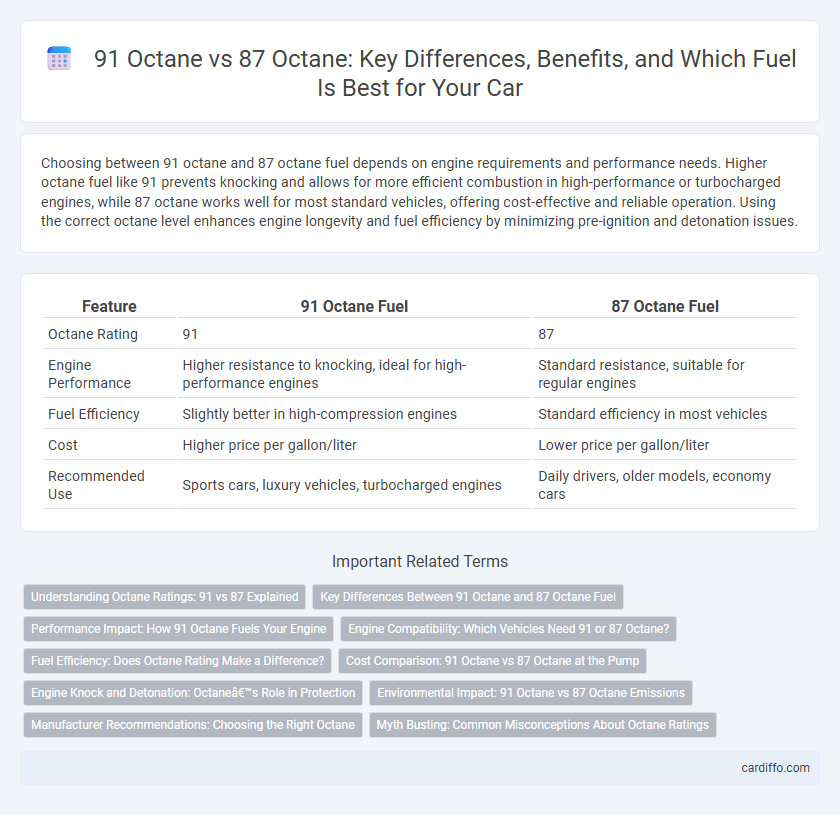Choosing between 91 octane and 87 octane fuel depends on engine requirements and performance needs. Higher octane fuel like 91 prevents knocking and allows for more efficient combustion in high-performance or turbocharged engines, while 87 octane works well for most standard vehicles, offering cost-effective and reliable operation. Using the correct octane level enhances engine longevity and fuel efficiency by minimizing pre-ignition and detonation issues.
Table of Comparison
| Feature | 91 Octane Fuel | 87 Octane Fuel |
|---|---|---|
| Octane Rating | 91 | 87 |
| Engine Performance | Higher resistance to knocking, ideal for high-performance engines | Standard resistance, suitable for regular engines |
| Fuel Efficiency | Slightly better in high-compression engines | Standard efficiency in most vehicles |
| Cost | Higher price per gallon/liter | Lower price per gallon/liter |
| Recommended Use | Sports cars, luxury vehicles, turbocharged engines | Daily drivers, older models, economy cars |
Understanding Octane Ratings: 91 vs 87 Explained
Octane rating measures a fuel's ability to resist knocking during combustion, with 91 octane offering higher resistance compared to 87 octane. Engines designed for high-performance or turbocharged models often require 91 octane to maintain efficiency and prevent engine damage. Using 87 octane in an engine requiring 91 can cause knocking, reduced power, and long-term engine wear.
Key Differences Between 91 Octane and 87 Octane Fuel
91 octane fuel has a higher resistance to engine knocking compared to 87 octane, making it suitable for high-performance or turbocharged engines that require greater combustion stability. The increased octane rating in 91 fuel prevents premature ignition under high compression, enhancing engine efficiency and protecting against damage. In contrast, 87 octane fuel is commonly used in standard engines designed for lower compression ratios, offering adequate performance and cost savings for everyday driving.
Performance Impact: How 91 Octane Fuels Your Engine
Using 91 octane fuel enhances engine performance by allowing higher compression ratios and more precise ignition timing, resulting in increased power output and efficiency. Engines designed for premium fuel benefit from reduced knocking and smoother acceleration, which 91 octane helps prevent compared to 87 octane. The improved combustion quality of 91 octane supports optimal fuel economy and longevity in high-performance and turbocharged engines.
Engine Compatibility: Which Vehicles Need 91 or 87 Octane?
91 octane fuel is designed for high-performance and luxury vehicles with high compression engines that require higher resistance to knocking. Most standard cars and light trucks are compatible with 87 octane fuel, which provides adequate performance for engines with lower compression ratios. Using the recommended octane rating ensures optimal engine efficiency, prevents knocking, and protects engine components from damage.
Fuel Efficiency: Does Octane Rating Make a Difference?
Higher octane fuel, such as 91 octane, does not inherently improve fuel efficiency in engines designed for 87 octane fuel because these engines do not benefit from the increased resistance to knocking that higher octane provides. Vehicles with high-compression engines or turbochargers may see slight efficiency gains with 91 octane due to optimized combustion, but average fuel economy remains largely unchanged in standard engines. Fuel efficiency differences between 87 and 91 octane are minimal unless the engine is specifically engineered to take advantage of higher octane fuel.
Cost Comparison: 91 Octane vs 87 Octane at the Pump
Fuel prices for 91 octane gasoline typically range from 10% to 20% higher per gallon compared to 87 octane, reflecting its higher performance rating and refinery costs. Drivers fueling with 91 octane pay an average of $0.30 to $0.50 more per gallon than those using 87 octane, impacting overall fuel expenses when filling a tank. Choosing 87 octane fuel can result in significant savings over time, especially for vehicles that do not require high-octane fuel for optimal engine performance.
Engine Knock and Detonation: Octane’s Role in Protection
91 Octane fuel provides superior resistance to engine knock and detonation compared to 87 Octane by raising the fuel's threshold for premature ignition under compression. Higher octane ratings prevent spark knock, which occurs when the air-fuel mixture ignites too early, thereby protecting engine components from damage and maintaining optimal performance. Using the correct octane rating specified for an engine ensures efficient combustion and longevity by minimizing harmful detonation effects.
Environmental Impact: 91 Octane vs 87 Octane Emissions
91 octane fuel typically produces lower carbon monoxide and hydrocarbon emissions compared to 87 octane due to more efficient combustion in high-performance engines. While 87 octane fuels may emit slightly higher levels of nitrogen oxides and particulate matter, the difference in overall greenhouse gas emissions between the two is minimal when used in compatible vehicles. Choosing the correct octane rating for an engine optimizes fuel efficiency and reduces pollutant output, which supports better air quality and lowers environmental impact.
Manufacturer Recommendations: Choosing the Right Octane
Manufacturer recommendations for octane ratings are crucial to optimizing engine performance and longevity, with most standard vehicles designed to run efficiently on 87 octane fuel. Using 91 octane fuel in engines that specify 87 octane generally offers no performance benefit and can lead to unnecessary expenses. High-performance or turbocharged engines often require 91 octane or higher to prevent knocking and ensure optimal combustion, so adhering to the manufacturer's specified octane rating is essential for maintaining warranties and fuel economy.
Myth Busting: Common Misconceptions About Octane Ratings
Many drivers mistakenly believe that 91 octane fuel always improves engine performance compared to 87 octane, but octane rating primarily indicates a fuel's resistance to knocking, not its power output. Vehicles designed for regular 87 octane fuel do not gain significant benefits from using 91 octane, and higher octane fuels are only necessary for high-compression or turbocharged engines to prevent engine knock. Understanding that octane rating is about preventing premature combustion, not increasing fuel energy, helps debunk myths about octane levels correlating directly with better mileage or horsepower.
91 Octane vs 87 Octane Infographic

 cardiffo.com
cardiffo.com